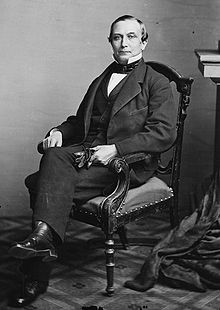Philip Francis Thomas
| Philip Francis Thomas | |
|---|---|
 |
|
| Member of the U.S. House of Representatives from Maryland's 2nd district |
|
|
In office March 4, 1839 – March 3, 1841 |
|
| Preceded by | James Pearce |
| Succeeded by | James Pearce |
| 28th Governor of Maryland | |
|
In office January 3, 1848 – January 6, 1851 |
|
| Preceded by | Thomas Pratt |
| Succeeded by | Enoch Louis Lowe |
| 23rd United States Secretary of the Treasury | |
|
In office December 12, 1860 – January 14, 1861 |
|
| President | James Buchanan |
| Preceded by | Howell Cobb |
| Succeeded by | John Adams Dix |
| Member of the U.S. House of Representatives from Maryland's 1st district |
|
|
In office March 4, 1875 – March 3, 1877 |
|
| Preceded by | Ephraim King Wilson II |
| Succeeded by | Daniel M. Henry |
| Member of the Maryland House of Delegates | |
|
In office 1838 1843 1845 |
|
| Personal details | |
| Born |
September 12, 1810 Easton, Maryland, US |
| Died | October 2, 1890 (aged 80) Baltimore, Maryland, US |
| Political party | Democratic |
| Spouse(s) | Sarah Maria Kerr Thomas Clintonia (Wright) May Thomas |
| Alma mater | Dickinson College |
| Profession | Politician, Lawyer |
Philip Francis Thomas (September 12, 1810 – October 2, 1890) was an American lawyer and politician.
Born in Easton, Maryland, he graduated from Dickinson College in Pennsylvania in 1830. He studied law and became a lawyer in Easton. He was a delegate to the Maryland's constitutional convention in 1836 and a member of the Maryland House of Delegates in 1838, 1843, and 1845. He was elected as a Democrat to the 26th Congress in 1838 from the 2nd Congressional district of Maryland, but declined to run again in 1840. He went back to his law practice, but returned to politics eight years later when he was elected the 28th Governor of Maryland, a position he held through 1851.
From 1851 to 1853, he was Comptroller of Maryland and then collector of the port of Baltimore from 1853 to 1860, and United States Commissioner of Patents for a fragment of that year (February through December). He was appointed United States Secretary of the Treasury in the Presidential Cabinet of President James Buchanan and served from December 12, 1860 to January 14, 1861.
When Howell Cobb, the 22nd Secretary of the Treasury resigned in 1860, Buchanan appointed Thomas the 23rd Secretary. Thomas reluctantly accepted the position. Immediately upon entering office, Thomas had to market a bond to pay the interest on the public debt. There was little faith in the stability of the country due to the threat of secession by the Southern states, and war appeared inevitable. Northern bankers refused to invest in Thomas's loan, wary that the money would go to the South. Following Interior Secretary Jacob Thompson, Thomas resigned after only a month in response to his failure to obtain the loan.
...
Wikipedia
